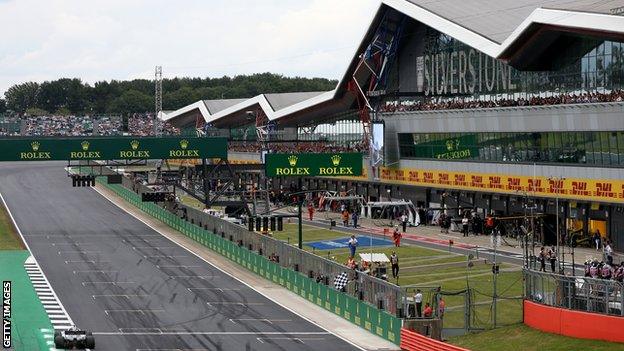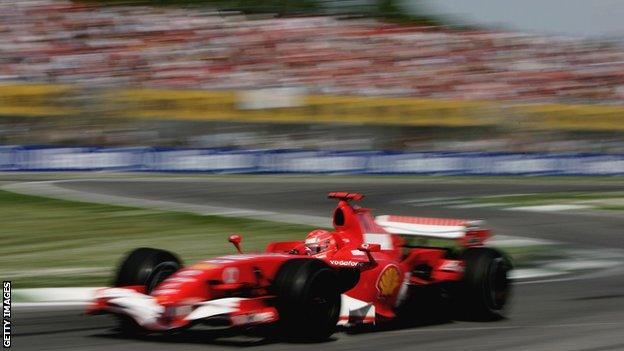Formula 1: British Grand Prix under threat over money
- Published

Silverstone has held the British Grand Prix every year since 1987
The British Grand Prix is under threat this year because of a financial stand-off between Formula 1 and Silverstone.
F1 believes Silverstone is making unreasonable demands to host races on consecutive weekends on 19 and 26 July.
High-level sources say Silverstone initially asked for £15m to host the races - the same amount it pays as its race fee, which F1 is waiving.
F1 has offered to pay enough money to ensure Silverstone is not out of pocket.
Insiders say the sport has offered to cover all costs the track will incur for hosting the two grands prix, as well as a degree of compensation for lost earnings from the likes of ticket sales and vendor licensing.
Sources speaking on condition of anonymity said Silverstone had lowered its asking price in recent days but that the two sides remained a considerable distance apart in their positions on what they regarded as a fair price for the races to go ahead.
F1 declined to comment. A Silverstone spokesperson said: "Silverstone and F1 remain in close dialogue with each other and the relevant authorities to try to make a British Grand Prix happen behind closed doors."
Hockenheim in Germany is said to be the leading contender to replace Silverstone if an agreement cannot be struck, with Imola in Italy an outside contender.
Neither track was on the original 2020 calendar. Hockenheim hosted the German Grand Prix last year but could not come to an agreement on a new contract, while Imola last hosted F1 in 2006.
A number of British-based teams are said to have contacted F1 and expressed concern about Silverstone's actions, which they see as inappropriate at a time when the sport is suffering a significant financial shortfall as a result of the coronavirus crisis. One senior figure said its stance was "outrageous" in the circumstances.
Ten grands prix have so far been postponed or cancelled this year and F1 is scrambling to try to get a legitimate World Championship season off the ground.
Race fees account for 30% of F1's total income, and a reduced calendar with a series of races held behind closed doors is going to lead to a drop in revenue this year of many millions of pounds.
Owner Liberty Media gave the sport a $1.4bn cash injection through a series of internal financial transfers between its companies last month to ensure F1 can ride out the coronavirus crisis.

Michael Schumacher won the last F1 race to be held at Imola, in 2006
But F1 chairman Chase Carey said on a call with investors last week: "Whether it's the teams or promoters or sponsors, we're not going to be handing out candy to everybody.
"We're going to expect to be treated fairly, but we're going to deal with it as adults and with the expectation that 2021 is going to look like the business that we all knew four months ago."
Carey did not directly refer to Silverstone in the call, but insiders say that comment can be taken as a reference to the current impasse in talks with the track.
Time is running out to make a deal because F1 needs to know this week whether there will be a race at Silverstone as it seeks to finalise arrangements for the European part of the season.
This is complicated by talks with the UK government over a new requirement for international travellers to self-isolate for 14 days after arriving in the UK.
F1 has a plan it believes will ensure the races are coronavirus-safe, with extensive testing and social distancing measures, which it hopes will justify an exemption for travelling staff.
An F1 spokesman said the sport was in "ongoing but constructive conversations with government".
F1 hopes to start the season with two races in Austria on 5 and 12 July, followed by two at Silverstone, making races on four consecutive weekends.
It then hopes to move on to a number of other races in Europe, probably four, in August and early September, from a selection of F1 tracks in Spain, Hungary, France, Belgium, the Netherlands and Italy.
After that, it would move on to the rest of the world, with either Canada or Singapore likely to be the first grand prix outside Europe, depending on their ability and willingness to host an international event in mid-September.
Only one of those two events is likely to happen and Singapore has to be held on its original date of 20 September or not at all.